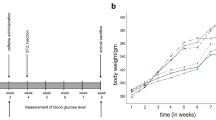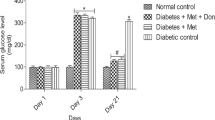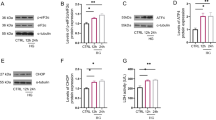Abstract
Diabetes mellitus (DM) is associated with the increased risk of the central nervous system complications as cerebrovascular disease, impaired cognition, dementia and neurodegeneration. Curcumin is a polyphenol with anti-oxidant, anti-inflammatory, anti-hyperlipidemic, and anti-cancer effects. Therefore, the present study was aimed to focus on the mechanistic insights of diabetes-induced hippocampal neurodegeneration in addition to shedding the light on the modulatory effect of curcumin. Twenty-eight male Wistar rats were randomly divided into four groups. Type I DM was induced by a single intra-peritoneal injection of streptozotocin (STZ) (65 mg/kg b.w.). Curcumin (100 mg/kg b.w.) was given to the diabetic group after the induction and for eight weeks. Hippocampal glucose-regulated protein 78 (GRP78), activating transcription factor 4 (ATF-4), Bcl2 and choline acetyl transferase (ChAT) genes expression were assessed. Heat shock protein 70 (HSP70), Bcl-2-Associated X protein (Bax), Interferon-γ (INF-γ) and CCAAT-enhancer-binding protein homologous protein (CHOP) levels in the hippocampus were immunoassayed, in addition to the assessment of glycemic and redox status. Curcumin significantly improved blood glucose level, redox status, cellular stress, and decreased INF-γ and Bax levels, down-regulated GRP78 and ATF-4 expression, meanwhile, up-regulated Bcl2 and ChAT expression in hippocampus. Histological findings proved the biochemical and molecular findings. Our results support curcumin as a potential neuro-protective agent against diabetes induced hippocampal neurodegeneration.





Similar content being viewed by others
References
Abdel-Moneim A, Yousef A, Abd El-Twab SM, Abdel Reheim ES, Ashour MB (2017) Gallic acid and p-coumaric acid attenuate type 2 diabetes-induced neurodegeneration in rats. Metab Brain Dis 32(4):1279–1286. https://doi.org/10.1007/s11011-017-0039-8
Abo-Salem OM, Harisa GI, Ali TM, El-Sayed El-S M, Abou-Elnour FM (2014) Curcumin ameliorates streptozotocin-induced heart injury in rats. J Biochem Mol Toxicol 28(6):263–270. https://doi.org/10.1002/jbt.21562
Acar A, Akil E, Alp H, Evliyaoglu O, Kibrisli E, Inal A, Unan F, Tasdemir N (2012) Oxidative damage is ameliorated by curcumin treatment in brain and sciatic nerve of diabetic rats. Int J Neurosci 122(7):367–372. https://doi.org/10.3109/00207454.2012.657380
Bancroft J. D, Layton C and Suvarna S. K. (2013) Bancroft's theory and practice of histological Techniques8th edition. 7th edition, ed. Oxford: Churchill Livingstone: Elsevier
Bellini S, Barutta F, Mastrocola R, Imperatore L, Bruno G, Gruden G (2017) Heat shock proteins in vascular diabetic complications: review and future perspective. Int J Mol Sci 18(12):2709. https://doi.org/10.3390/ijms18122709
Casas C (2017) GRP78 at the Centre of the Stage in Cancer and Neuroprotection. Front Neurosci 11:177. https://doi.org/10.3389/fnins.2017.00177
Chang CC, Chen SD, Lin TK, Chang WN, Liou CW, Chang AY, Chan SH, Chuang YC (2014) Heat shock protein 70 protects against seizure-induced neuronal cell death in the hippocampus following experimental status epilepticus via inhibition of nuclear factor-κB activation-induced nitric oxide synthase II expression. Neurobiol Dis 62:241–249. https://doi.org/10.1016/j.nbd.2013.10.012
Cong XQ, Piao MH, Li Y, Xie L, Liu Y (2016) Bis (maltolato) oxovanadium (IV) (BMOV) attenuates apoptosis in high glucose-treated cardiac cells and diabetic rat hearts by regulating the unfolded protein responses (UPRs). Biol Trace Elem Res 173(2):390–398. https://doi.org/10.1007/s12011-016-0668-5
Cunard R (2015) Endoplasmic reticulum stress in the diabetic kidney, the good, the bad and the ugly. J Clin Med 4(4):715–740. https://doi.org/10.3390/jcm4040715
Das KK, Razzaghi-Asl N, Tikare SN, Di Santo R, Costi R, Messore A, Pescatori L, Crucitti GC, Jargar JG, Dhundasi SA, Saso L (2016) Hypoglycemic activity of curcumin synthetic analogues in alloxan-induced diabetic rats. J Enzyme Inhib Med Chem 31(1):99–105. https://doi.org/10.3109/14756366.2015.1004061
Fujii T, Mashimo M, Moriwaki Y, Misawa H, Ono S, Horiguchi K, Kawashima K (2017) Physiological functions of the cholinergic system in immune cells. J Pharmacol Sci 134(1):1–21. https://doi.org/10.1016/j.jphs.2017.05.002
Galehdar Z, Swan P, Fuerth B, Callaghan SM, Park DS, Cregan SP (2010) Neuronal apoptosis induced by endoplasmic reticulum stress is regulated by ATF4-CHOP-mediated induction of the Bcl-2 homology 3-only member PUMA. J Neurosci 30(50):16938–16948. https://doi.org/10.1523/JNEUROSCI.1598-10.2010
Gidalevitz T, Kikis EA, Morimoto RI (2010) A cellular perspective on conformational disease: the role of genetic background and proteostasis networks. Curr Opin Struct Biol 20(1):23–32. https://doi.org/10.1016/j.sbi.2009.11.001
Hamed SA (2017) Brain injury with diabetes mellitus: evidence, mechanisms and treatment implications. Expert Rev Clin Pharmacol 10(4):409–428. https://doi.org/10.1080/17512433.2017.1293521
Hetz C, Mollereau B (2014) Disturbance of endoplasmic reticulum proteostasis in neurodegenerative diseases. Nat Rev Neurosci 15(4):233–249. https://doi.org/10.1038/nrn3689
Huang HC, Zheng BW, Guo Y, Zhao J, Zhao JY, Ma XW, Jiang ZF (2016) Antioxidative and Neuroprotective effects of Curcumin in an Alzheimer's disease rat model co-treated with Intracerebroventricular Streptozotocin and subcutaneous D-Galactose. J Alzheimers Dis 52(3):899–911. https://doi.org/10.3233/JAD-150872
Ji X, Zhang L, Liu R, Liu Y, Song J, Dong H, Jia Y, Zhou Z (2014) Potential targets for protecting against hippocampal cell apoptosis after transient cerebral ischemia-reperfusion injury in aged rats. Neural Regen Res 9(11):1122–1128. https://doi.org/10.4103/1673-5374.135314
Kanitkar M, Bhonde RR (2008) Curcumin treatment enhances islet recovery by induction of heat shock response proteins, Hsp70 and heme oxygenase-1, during cryopreservation. Life Sci 82(3–4):182–189
Kim HY, Park EJ, Joe EH, Jou I (2003) Curcumin suppresses Janus kinase-STAT inflammatory signaling through activation of Src homology 2 domain-containing tyrosine phosphatase 2 in brain microglia. J Immunol 171(11):6072–6079
Kim SJ, Son TG, Park HR, Park M, Kim MS, Kim HS, Chung HY, Mattson MP, Lee J (2008) Curcumin stimulates proliferation of embryonic neural progenitor cells and neurogenesis in the adult hippocampus. J Biol Chem 283(21):14497–14505. https://doi.org/10.1074/jbc.M708373200
Kocaadam B, Curcumin ŞN (2017) an active component of turmeric (Curcuma longa), and its effects on health. Critical Reviews in Food Science and Nutrition 57(13):2889–2895. https://doi.org/10.1080/10408398.2015.1077195
Kumar PT, George N, Antony S, Paulose CS (2013) Curcumin restores diabetes induced neurochemical changes in the brain stem of Wistar rats. Eur J Pharmacol 702(1–3):323–331. https://doi.org/10.1016/j.ejphar.2013.01.012
Lakshmanan AP, Watanabe K, Thandavarayan RA, Sari FR, Meilei H, Soetikno V, Arumugam S, Giridharan VV, Suzuki K, Kodama M (2011) Curcumin attenuates hyperglycaemia-mediated AMPK activation and oxidative stress in cerebrum of streptozotocin-induced diabetic rat. Free Radic Res 45(7):788–795. https://doi.org/10.3109/10715762.2011.579121
Lee WH, Loo CY, Bebawy M, Luk F, Mason RS, Rohanizadeh R (2013) Curcumin and its derivatives: their application in neuropharmacology and neuroscience in the 21st century. Curr Neuropharmacol 11(4):338–378. https://doi.org/10.2174/1570159X11311040002
Levine RL, Garland D, Oliver CN, Amici A, Climent I, Lenz AG, Ahn BW, Shaltiel S, Stadtman ER (1990) Determination of carbonyl content in oxidatively modified proteins. Methods of Enzymology 186:464–478
Lin W, Kemper A, Dupree JL, Harding HP, Ron D, Popko B (2006) Interferon-gamma inhibits central nervous system remyelination through a process modulated by endoplasmic reticulum stress. Brain 129(Pt 5):1306–1318
Liu G, Su L, Hao X, Zhong N, Zhong D, Singhal S, Liu X (2012) Salermide up-regulates death receptor 5 expression through the ATF4-ATF3-CHOP axis and leads to apoptosis in human cancer cells. J Cell Mol Med 16(7):1618–1628. https://doi.org/10.1111/j.1582-4934.2011.01401.x
Liu Z, Lv Y, Zhao N, Guan G, Wang J (2015) Protein kinase R-like ER kinase and its role in endoplasmic reticulum stress-decided cell fate. Cell Death and Disease 6:e1822. https://doi.org/10.1038/cddis.2015.183
Lowry OH, Rosebrough NJ, Farr AL, Randall RJ (1951) Protein measurement with the Folin phenol reagent. J Biol Chem 193(1):265–275
Luo F, Huang R, Yang YJ, Yu XH (2003) Protective effect and mechanism of pretreatment with curcumin on infectious brain edema in rats. Zhonghua Er Ke Za Zhi 41(12):940–944
Mait P, Manna J (2014) Activation of heat shock proteins by Nanocurcumin to prevent neurodegenerative diseases. Brain Disord Ther 3:139. https://doi.org/10.4172/2168-975X.1000139
Matsuura K, Otani M, Takano M, Kadoyama K, Matsuyama S (2018) Proteomic analysis of Hippocampus and cortex in Streptozotocin-induced diabetic model mice showing dementia. J Diabetes Res 2018:8953015. https://doi.org/10.1155/2018/8953015
Muriach M, Flores-Bellver M, Romero FJ, Barcia JM (2014) Diabetes and the brain: oxidative stress, inflammation, and autophagy. Oxidative Med Cell Longev 2014:102158. https://doi.org/10.1155/2014/102158
Nakka VP, Gusain A, Raghubir R (2010) Endoplasmic reticulum stress plays critical role in brain damage after cerebral ischemia/reperfusion in rats. Neurotox Res 17(2):189–202. https://doi.org/10.1007/s12640-009-9110-5
Nguyen D. H, Zhou T, Shu J, and Mao J. H, Nguyen D (2013). Quantifying chromogen intensity in immunohistochemistry via reciprocal intensity. Cancer InCytes 2; (1) ):e. https://doi.org/10.1038/protex.2013.097
Patel SN, Pandya K, Clark GJ, Parikh MC, Lau-Cam CA (2016) Comparison of taurine and pantoyltaurine as antioxidants in vitro and in the central nervous system of diabetic rats. Exp Toxicol Pathol 68(2–3):103–112. https://doi.org/10.1016/j.etp.2015.11.002
Rashid K, Chowdhury S, Ghosh S, Sil PC (2017) Curcumin attenuates oxidative stress induced NFκB mediated inflammation and endoplasmic reticulum dependent apoptosis of splenocytes in diabetes. Biochem Pharmacol 143:140–155. https://doi.org/10.1016/j.bcp.2017.07.009
Rashid K, Sil PC (2015) Curcumin enhances recovery of pancreatic islets from cellular stress induced inflammation and apoptosis in diabetic rats. Toxicol. Appl. Pharmacol 282(3):297–310. https://doi.org/10.1016/j.taap.2014.12.003
Ron D, Walter P (2007) Signal integration in the endoplasmic reticulum unfolded protein response. Nat Rev Mol Cell Biol 8(7):519–529
Rozas P, Bargsted L, Martínez F, Hetz C, Medinas DB (2017) The ER proteostasis network in ALS: determining the differential motoneuron vulnerability. Neurosci Lett 636:9–15. https://doi.org/10.1016/j.neulet.2016.04.066
Samarghandian S, Azimi-Nezhad M, Farkhondeh T, Samini F (2017) Anti-oxidative effects of curcumin on immobilization-induced oxidative stress in rat brain, liver and kidney. Biomed Pharmacother 87:223–229. https://doi.org/10.1016/j.biopha.2016.12.105
Sayed KM, Mahmoud AA (2016) Heat shock protein-70 and hypoxia inducible factor-1α in type 2 diabetes mellitus patients complicated with retinopathy. Acta Ophthalmol 94(5):e361–e366. https://doi.org/10.1111/aos.12919
Schindelin J, Arganda-Carreras I, Frise E, Kaynig V, Longair M, Pietzsch T, Preibisch S, Rueden C, Saalfeld S, Schmid B, Tinevez J, White D, Hartenstein V, Eliceiri K, Tomancak P, Cardona A (2012) Fiji: an open-source platform for biological-image analysis. Nat Methods 9(7):676–682. https://doi.org/10.1038/nmeth.2019
Sherin A, Anu J, Peeyush KT, Smijin S, Anitha M, Roshni BT, Paulose CS (2012) Cholinergic and GABAergic receptor functional deficit in the hippocampus of insulin-induced hypoglycemic and streptozotocin-induced diabetic rats. Neuroscience 202:69–76. https://doi.org/10.1016/j.neuroscience.2011.11.058
Shukla V, Shakya AK, Perez-Pinzon MA, Dave KR (2017) Cerebral ischemic damage in diabetes: an inflammatory perspective. J Neuroinflammation 14(1):21. https://doi.org/10.1186/s12974-016-0774-5
Spijker S (2011) Dissection of rodent brain regions. In: Li K (ed) Neuroproteomics. Neuromethods, vol 57. Humana Press, Totowa, NJ, pp 13–26
Testa R, Bonfigli AR, Prattichizzo F, La Sala L, De Nigris V, Ceriello A (2017) The "metabolic memory" theory and the early treatment of hyperglycemia in prevention of diabetic complications. Nutrients 9(5). Pii):E437. https://doi.org/10.3390/nu9050437
Venkat P, Chopp M, Chen J (2017) Blood–Brain Barrier Disruption, Vascular Impairment, and Ischemia/Reperfusion Damage in Diabetic Stroke. Journal of the American Heart Association 6(6): pii):e005819. https://doi.org/10.1161/JAHA.117.005819
Zhou JH, Hao ML, Zhao S, Chen HE, Chen D, Ying L, Sun Q, Wang WT (2013) Effects of curcumin on pneumocyte apoptosis and CHOP in pulmonary ischemia/reperfusion injury of mice. Zhongguo Ying Yong Sheng Li Xue Za Zhi 29(4):318–323
Zineldeen D, Sarhan N, Tahoon N, Wasfy R (2016) Mechanistic insight of transient receptor potential Melastatin 8 role in Streptozotocin induced diabetic nephropathy. International journal of Biochemistry Research & Review 15:1–17. https://doi.org/10.9734/IJBCRR/2016/31435
Zou W, Yuan J, Tang Z, Wei H, Zhu W, Zhang P, Gu H, Wang C, Tang X (2017) Hydrogen sulfide ameliorates cognitive dysfunction in streptozotocin-induced diabetic rats: involving suppression in hippocampal endoplasmic reticulum stress. Oncotarget 8(38):64203–64216. https://doi.org/10.18632/oncotarget.19448
Acknowledgments
The authors would like to thank Dr./ Safwat M., (Nagoya City University) for providing anti-ChAT antibodies, helping in image analysis and for his helpful discussion. The authors are greatly appreciating the assistance provided by the technicians in Biochemistry, Histology departments and the central laboratory Faculty of Medicine, Tanta University, Egypt for the technical assistance.
Author information
Authors and Affiliations
Contributions
All the named authors participated sufficiently in this research work according to the specialty and expert of each one as follows: Walaa A. Keshk and Doaa H Zineldeen designed the research protocol, assay the biochemical parameters, conducted the statistical analysis, presented the results as tables or figures, wrote and revised the manuscript. Walaa S. Elseady and Naglaa I. Sarhan conducted the histological and immunohistochemical examination. All authors reviewed and edited the manuscript and approved its final version.
Corresponding author
Ethics declarations
Conflict of interest
No competing interests to declare.
Additional information
Publisher’s note
Springer Nature remains neutral with regard to jurisdictional claims in published maps and institutional affiliations.
Rights and permissions
About this article
Cite this article
Keshk, W.A., Elseady, W.S., Sarhan, N.I. et al. Curcumin attenuates cytoplasmic/endoplasmic reticulum stress, apoptosis and cholinergic dysfunction in diabetic rat hippocampus. Metab Brain Dis 35, 637–647 (2020). https://doi.org/10.1007/s11011-020-00551-0
Received:
Accepted:
Published:
Issue Date:
DOI: https://doi.org/10.1007/s11011-020-00551-0




